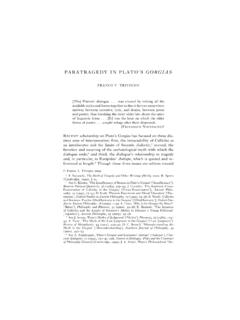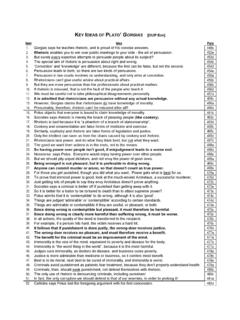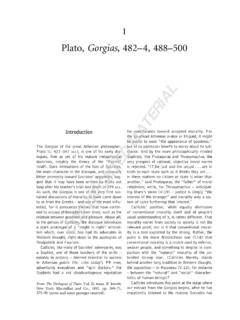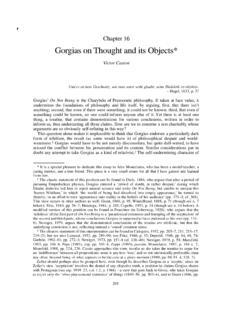Transcription of Gorgias discussion compile - Community College of Philadelphia
1 discussion Forum CompilationText: Gorgias Encomium to Helen According to Gorgias , the traditional assessment of Helen as being a whore, and responsible for the death of thousands, is mistaken. In support of his rehabilitation of her, he proposes several arguments - or what look like several arguments, anyway. Choose any one of the arguments Gorgias makes in defense of Helen, and explain how it is supposed to work. How exactly do the arguments relieve her of responsibility and, if they do, for what do they relieve her of responsibility?Shyamala JoshiGorgias Encomium to Helen is a persuasive text written to accomplish two goals. Firstly, to persuade his audience of the possibility that their long held popular view of Helen as being a whore and responsible for the death of many men could be incorrect. Secondly, to inform and convince prospective students of the power of persuasive offers four possible defenses for Helen s actions, I will address the argument he makes for persuasion that she was by words seduced.
2 Gorgias puts forth the idea that Helen may have fallen victim to Paris persuasive arguments to win her over. He claims that speech is a powerful tool and can be used for both well-intentioned and ill-intended ends on the listener. If Helen was swayed by the effects of a persuasive argument, then she should not be to blame for any argument for persuasion can be applied not only to explain Helen's actions, but also to explain the popular perception of Helen as a whore, which has been passed down through history in the form of a poem The Iliad. Gorgias makes the case that he regards all poetry as speech, and all speech as being capable of deceiving the audience to believe an argument for that which is more appealing over that which is necessarily truth. In this way, the Iliad itself could be seen as a form of persuasive JacksonGorgias' "fourth cause in a fourth discourse" is the possible argument that I choose.
3 In this piece, Gorgias describes men as those who are "lesser" than the gods and those whose "premeditation" cannot prevent the "predetermination" of a god. He brings up that if it was love for Alexander (Paris) which lead Helen to act as she did, then she is not responsible for the action that she took, for "love, a god, prevails over the divine power of the gods, [a lesser one would not] be able to reject and refuse it." Gorgias seems to refer to the personification of love in a Greek god of the time and not just a human emotion (perhaps Aphrodite or Cupid). Gorgias wishes to persuade the reader that Helen is relieved of responsibility for her actions due to her own persuasion by unavoidable and irresistable forces. If this is correct, Helen could be said to be relieved of being at fault for adultery (being a whore) and any other faults that are connected to her so-called VargasGorgias proposes four different arguments as to why Helen of Troy should be considered relieved for her responsibility of being put to blame for causing the Trojan War.
4 One point that he proposes is that it was fate that caused Helen to leave Sparta and move to Troy with Paris. According to Gorgias , Helen did what she did "by Fate's will and gods wishes and Necessity's decrees." Meaning, that it was pre-determined by the god's for Helen to go off to Troy with Paris. If Helen were living at home with her parents, not married or with children then she would have ended up in Troy with Paris one way or another. This proposal relives blame of Helen by removing the blame from her and in turn placing it on to the gods. Gods are characterized as the highest power and what they will, therefore becomes. Gorgias provides proof by stating, " by nature the stronger force is not prevented by the weaker but the weaker is rued and driven by the Forum compilation for Gorgias seminar page-1 of 7stronger; the stronger leads, the weaker follows." Helen was the weaker in this instance, and the gods were obviously the stronger force in which Helen distinctly followed what the gods had set for her to do.
5 The cause of war and mayhem therefore should not to be blamed on Helen, yet the blame should be placed on the gods, they who are the stronger force, for creating such a fate for Helen that would ultimately cause destruction and DuganOne of Gorgias ' arguments in "The Encomium to Helen" is what I might characterize as the "divine argument", whereby the wishes of the gods and fate are held responsible for Helen's going to Troy. The "divine argument" operates thus on Gorgias ' line: it is impossible for human premeditation to prevent a god's predetermination. A weaker force is by nature ruled and driven by a stronger force; the weaker follows the stronger. Therefore, since a god is stronger than a human being in force, wisdom and other ways, what the god or fate decrees is what will happen. If one takes this argument and applies it to Helen, then she went to Troy because the gods and fate predetermined that she was to go.
6 If the cause for her going to Troy was already decreed, then she could not help or prevent it from happening, nor could she change it. If this is the case, then Helen is relieved of the responsibility of being a whore or for the death of thousands. She is not guilty of being a whore because the stronger force--the gods and/or fate already decreed that she was going with Paris; the decision was neither hers nor hers to make. Neither is she responsible for the death of thousands because, again, it was not her decision to go to Troy; she was "ruled and driven" by a force or forces stronger than she was; that is to say, she was forced and compelled by divine power to go to Troy. This leaves the fighting that occurs in her stead to the gods, fate, and/or human wills; they, not she, are responsible for the aftermath of her journey to HazlittIn the Gorgias writing, "Encomium to Helen" Gorgias blames the Trojan War on Paris and Helen running off together.
7 Gorgias makes many arguments that are supposed dismiss blame from Helen. First he argues that it could have been force, then he speculates that it was the power of persuasion by speech, then he goes on to say that Helen was in most relevant of all the arguments is the third explanation, which argues that Helen was persuaded by speech. Speech is a very powerful tool, which can change many people's feeling and sometimes even make one deny or doubt a position they once held as true. Speech also evokes emotions in people, emotions that often make them act out in a peculiar way. And Later in his this explanation, Gorgias introduces witchcraft and drugs as being a good comparison to the persuasion of speech, to absolve Helen from the blame. Gorgias says that speech can have the same effects on the soul as drugs effect the body". If this comparison is taken as just, then, like someone who is under the influence of drugs, Helen under the influence of Paris' speech had no control of her actions.
8 On the lines of witchcraft it is stated that Paris could have deceived Helen's opinions. Therefore Helen, went with believing everything he said as true and this was the way that it did, in fact take place, Paris manipulated Helen with his words and is to blame for her running off with him. Helen was not thinking in the right state of mind, but was deceived into believing that what he said was right. Through his words all her morals and ethics were abolished and he was able to persuade her into taking GiorgiIn his essay Encomium to Helen , Gorgias presents four arguments on why Helen should be stripped of her blame. Whether she was taken by god s will, forced, persuaded by Paris, or overcome by love, Gorgias demonstrates that in each situation it was because of the actions of others that she left with Paris. His first two arguments are his strongest and in turn are presented first, with little attention given to them.
9 In ancient Greek society a mortal could not compete with the power of a god, just as a young woman would not be able to fend off Forum compilation for Gorgias seminar page-2 of 7the attack of a full grown man. The second two, with the power of speech being the focus my attention, require more first sets up his argument by building up the persuasiveness of speech. Speech, he says, is a powerful lord that with the smallest and invisible body accomplishes godlike works. In this, Gorgias compares the power of speech to the will of a god, an argument which he has already discredited. Throughout his argument he continually makes reference to this, by labeling speech as divine or equating it with the two arts of witchcraft and magic. He also compares speech to the second case he presents, that of force being the reason Helen left for Troy. Gorgias puts forth that she was carried away by speech just as if constrained by force.
10 According to this, once the mind and soul have been swept away by persuasion, the body follows. In addition Gorgias also appeals to the reader s emotions. It can banish fear and remove grief and instill pleasure and enhance pity. With this he is brings Helen to the level of the audience and appeals to their everyday thoughts and experiences. Finally Gorgias tries to instill a sense of pity for Helen in the audience by explaining the power of false speech. In this he draws a comparison of the effects of speech to that of a drug. As if having the mind and soul under its control was not enough, the drug of speech then takes over the taking these steps, does Gorgias rid Helen of her guilt? How would any member of the audience fare against such conditions? When taken together with his other arguments and, especially, his eloquence, one finds it hard not to sympathize with Helen.









